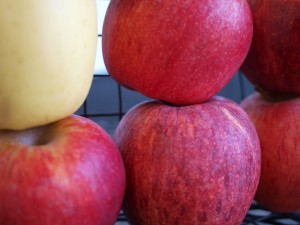 What should I buy organic if I’m on a limited budget?
What should I buy organic if I’m on a limited budget?
This is the question I seem to get asked the most. If I’m in an expansive mood, my answer can quickly veer into eye-glazing territory. I’m pretty passionate about organic food and tend to get long winded when discussing things like the Dirty Dozen and Clean 15, the reasons why we want to avoid GMOs, the potential health risks of chemical pesticides, and, finally, how to clarify priorities since organic can be expensive.
But if I’m ever pressed to pick one single food to buy organic, the answer is quick and easy: apples.
Apples are a perfect kid-friendly snack, and most families I know consume a lot of them. The first thing I do after school, especially when I have a few “extra” hungry kids running around the house, is start cutting up apples. Apples are portable, low in fat and salt (zero grams of either I’m pretty sure), high in fiber (so they keep you full) and vitamin C, and they make perfect vehicles for peanut butter. In addition to being the only thing I can think of to use in apple pies, apples can be a key ingredient in delicious savory dinners such as curries and baked chicken. And then there’s applesauce, apple juice, apple fritters, appletinis…
But, here’s the rub. According to USDA data, conventional apples (even washed ones) contain more pesticide residue on them than any other produce. While that alone is scary (pesticides, you know, were designed to kill things), consider that 81% of conventional apple orchards are sprayed with organophosphates, insecticides that were used as nerve-gas agents for chemical warfare and are considered toxic and potentially linked to nervous system damage, leukemia, and birth defects.
One of my criteria for what to buy organic is “things you eat a lot of,” and another one is “things on the Dirty Dozen list of most contaminated produce.” Well, apples fall into both categories, and have been #1 on the Dirty Dozen for as long as I can remember.
Currently only 6% of the U.S.’s apple orchards are organic. If more people bought more organic apples, this number would surely increase, removing some of those ghastly chemicals from the environment and exposing fewer farm workers to nerve gas (er, I mean pesticides). Since apples are grown in all 50 states, that would mean we all could have locally grown organic apples. I know I am oversimplifying the issue—and I’m sure it’s not always easy to grow Snow White–worthy apples without chemicals—but I bet if there were more of a market for organics, that would make it at least somewhat easier.
Then, of course, is the issue of cost. I know you might not be able to afford shop at Whole Foods or even regularly fill your cart with organic food, and organic apples do usually cost more than conventional. But think about it, the most expensive organic apples I saw on a recent trip to the store were $2.99 per pound and the cheapest conventional ones were $2.29 per pound. That’s a difference of 70 cents, which translates to about 35 cents for a quite large 1/2-pound apple.
Pennies well spent in my book.
By the way and just for the record, I know all about that Stanford Study that supposedly showed organic food to be no healthier than conventional food (and apparently not the preferred diet of unicorns either), but I have to say, Sorry Stanford, I know you guys are really smart, but um, you missed the point here. As you’ve probably read by now, the study “did not find strong evidence that organic foods are more nutritious or carry fewer health risks than conventional alternatives, though consumption of organic foods can reduce the risk of pesticide exposure.” Call me dimwitted, but wouldn’t reducing the “risk of pesticide exposure” imply “carrying fewer health risks?”
Oops, there I go getting long-winded again…!
Recipe: Organic Applesauce Even My Kids Will Eat
My mom made this recently, and my kids loved it. They can’t stand applesauce, or so they thought. I wanted to share this because it’s so easy, has no added sugar, and is a good way to make sure you don’t waste those organic apples you bought too many of last week at the farmer’s market.
Ingredients
5 lbs. (or more or less) organic apples, mixed varieties including Gala, Braeburn, and Fuji
Yep, that’s the ingredients list. Here’s the how-to: Core and partially peel the apples. Cut into bite-sized pieces and toss in your slow cooker with about 1/2 cup of water. Cook on Low for 8-10 hours. Check periodically, but you really can’t screw this up. Stir and add cinnamon if desired.

I’ve been buying organic pink lady apples by the bag (i think it’s more reasonable that way….) lately, so thanks for the affirmation. Stamford study be damned, you should do a taste organic vs. non organic apples. I did it with red peppers one day and everyone agreed the organic pepper tasted WAY better. that’s something.
Helen, I agree most taste way better, although I admit I’ve never done a blind taste test with apples. But man, organic butter is a million times better than conventional!
I agree Bevin! Well put, and not long winded. I always buy organic apples for all the reasons you stated, and don’t think, in a world of trade-offs, that this is one where you try to bank the $.35